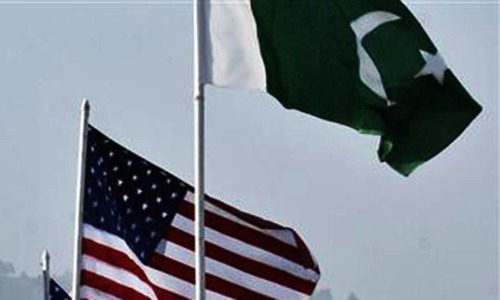PM’s US trip to be marked by tense diplomacy

ISLAMABAD: Confronted with the hard choice of accepting or rejecting the United States bargain on nuclear mainstreaming, Prime Minister Nawaz Sharif’s upcoming visit to the White House will be marked by tense diplomacy.
“The prime minister will be paying an official visit to the United States on 20-23 October,” Foreign Office spokesman Qazi Khalilullah said at the weekly media briefing. He pointed out that a comprehensive agenda would be discussed during the visit, including bilateral cooperation in the fields of economy, trade, education, defence, counter-terrorism, health and climate change.
Pakistani officials wouldn’t say anything about the nuclear deal being offered by the Obama administration, which in an undiplomatic description entails curbs on its nuclear programme in return for being allowed entry into nuclear cartels like ‘Nuclear Suppliers Group (NSG)’ that regulate the global nuclear trade and a nod to civil nuclear cooperation.
Also read: Obama to discuss Afghan reconciliation with Nawaz
US officials are relatively more forthcoming on this as they officially admit that topics to be discussed at the White House meeting include non-proliferation.
It will be after a very long time that the nuclear issue will take the centre stage in a meeting at this level.
The issue came into limelight following recent leaks in US media about the deal being discussed by the two countries. But the discussion has been taking place for some time now.
At the last round of the US-Pakistan Security, Strategic Stability and Non-proliferation Working Group in June in Washington, the two sides had agreed on “the desirability of continued outreach to integrate Pakistan into the international non-proliferation regime”.
Pakistan has been asking the United States for a civilian nuclear deal since 2008 and has also been building its case for admission into the NSG. In this regard, Pakistan lately updated its export control list for sensitive technologies and goods to make it compatible with international regimes. The move was praised by the US. But the strings attached to President Obama’s offer are unlikely to be acceptable to Pakistan.
“Yes we want a nuclear deal and are candidates for NSG membership, but there is no desperation for this. The Americans probably misread us,” a senior Pakistani official said in a background briefing on the issue.
“It would be difficult for us to compromise on the core interests. We did not build the nuclear programme as a status symbol, it’s there because of the unfriendly neighbourhood in which we live,” he added.
The official response is, however, available in the form of the statement of the National Command Authority (NCA) that met last month soon after the receipt of the invitation from President Obama for the meeting.
The NCA, an apex policymaking body of the country’s strategic programme, had then said that Pakistan was being compelled to maintain ‘Full Spectrum Deterrence’ because of India’s rapidly growing nuclear programme and absence of a conflict resolution mechanism. The situation, it had warned, was upsetting the strategic stability in the region.
Therefore, the thinking in Islamabad is that the deal being offered by the US should be on the same terms as granted to India, and not on new conditions.
Prime Minister Sharif would in this context also flag the issue of continuing tensions with India and the stalled peace dialogue.
President Obama would definitely try his best to strike a deal with Mr Sharif more for personal reasons. He would certainly like to add another feather to his cap after the Iran deal by getting Mr Sharif to agree on restricting his country’s nuclear programme, which is often described as the fastest growing in the world.
Published in Dawn, October 16th, 2015
On a mobile phone? Get the Dawn Mobile App: Apple Store | Google Play














































